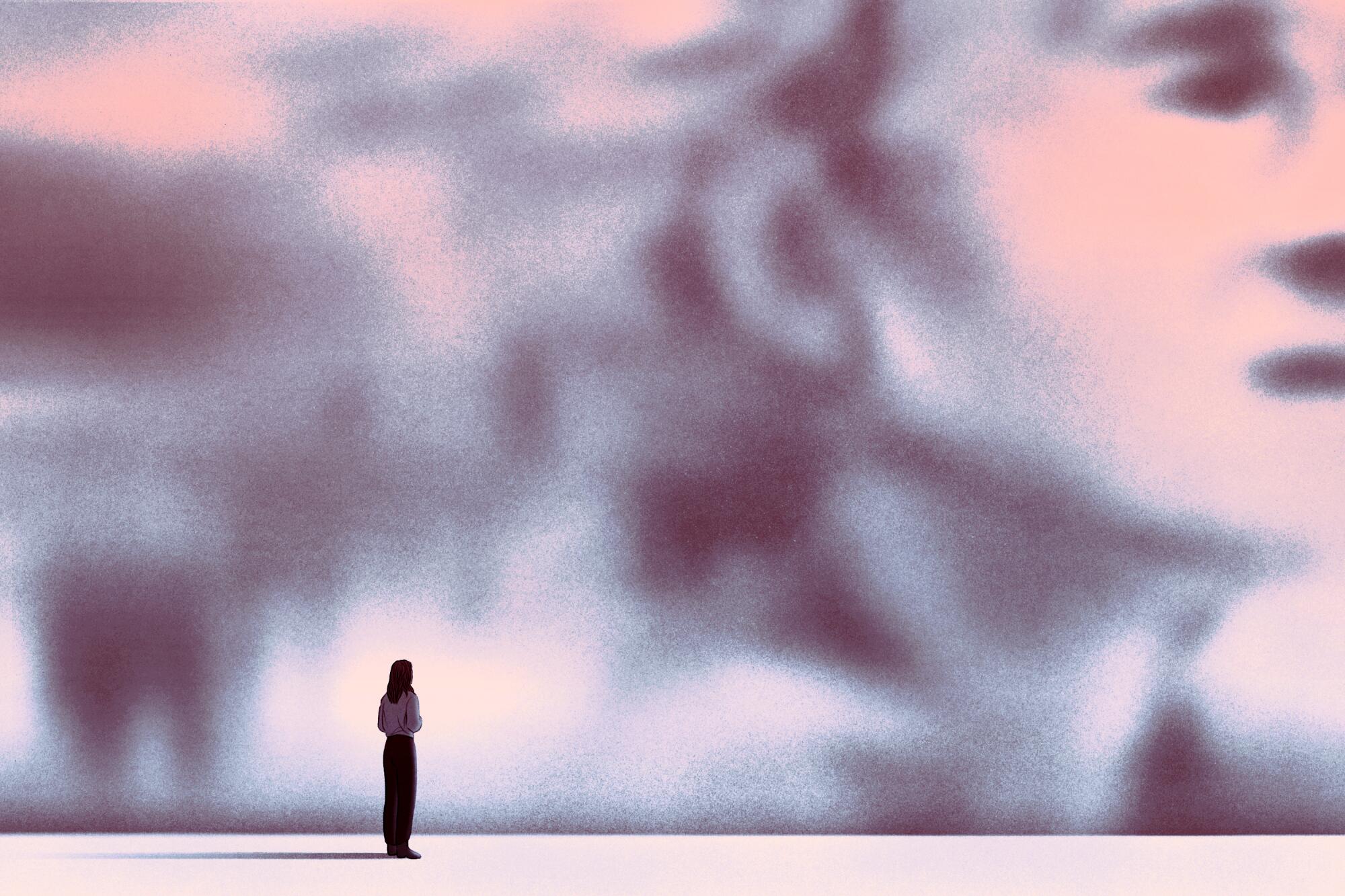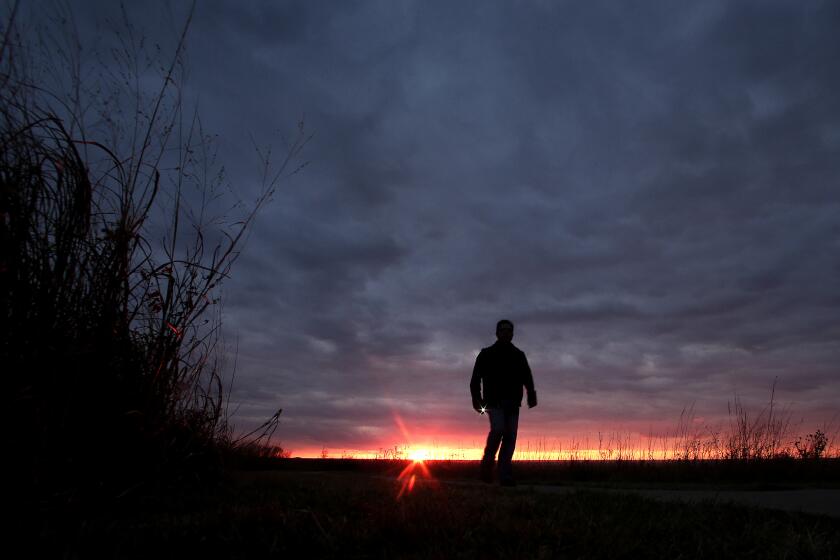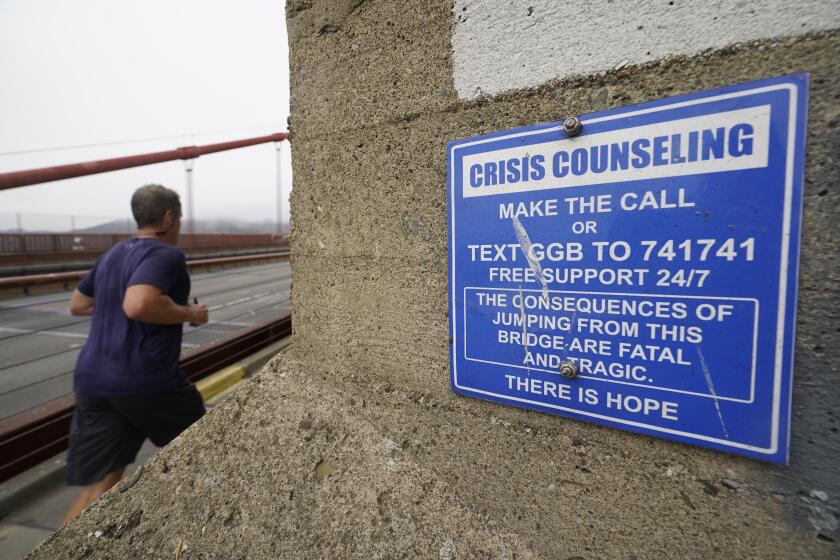
- Share via
No, I did not know.
In late July of 2019, I had dinner in New York with one of my dearest friends. We split a mediocre dessert, he walked me home, we hugged. A few nights later, he took his own life.
In the wake of his death, people asked if I knew it was coming, if there were signs, if I could work the whole thing in reverse. Perhaps they’d grown accustomed to asking. Suicide has been on a steady rise in the U.S., particularly in adults. In 2022, nearly 50,000 Americans died by suicide. The surgeon general has dubbed mental health “the defining health crisis of our time.”
You can want to live and die at the same time, says the author of “How Not to Kill Yourself.” Ambivalence is the saving grace of the despondent.
Because a crisis of this magnitude will not be solved overnight, the need for etiquette dealing with the involuntary collective known as “the loved ones” has become a strange bellwether of the problem. I still worry about offending people who have been traumatized by suicide, and I’m one of them. But if we are to give those asking questions the benefit of the doubt, surely we can extend that same benefit to those in the unfortunate position of replying. To that end, I suggest eliminating “did you know?” as a reaction to suicide.
Many people who die by suicide suffer from demonstrable depression, ideations or past attempts — battles that rage externally as well as internally. But not all cases are like this. And regardless of any indications along the road, “did you know?” induces dread for those left behind, compounding grief with feelings of futility.
One man’s death may not have been preventable, but understanding what led to it offers hope for others.
What, exactly, is being asked of us? (Was my friend someone who would casually suggest he’d rather “kill himself than walk through Times Square?” Absolutely. But to provide such an example would be like trying to help someone locate their car keys by whipping out a corkscrew and asking, “Will this do?”) To ask a grieving person whether they knew suicide was imminent also risks making the very people you’re trying to console feel accused, as if we ignored the briefing. As if we knew full well.
A few months ago, I spent an afternoon with a friend who had flown into town to visit her friend, who was dying of cancer. She asked if I had ever been around someone who had mere days to live. I said that no, I had not. But that’s not quite true. I have been. I just didn’t know it.
Contributor: Will the new 988 hotline be a game changer for mental health or a missed opportunity?
Suicide prevention and crisis response systems need more support.
The crux of the issue is that “did you know?” and questions like it have little to do with the person who died or the person being asked and everything to do with the person doing the asking. Consciously or not, people want to reframe a terrible story for their own comfort. They want to scan their own relationships for abnormalities, to reassure themselves they aren’t missing something. They are saddled with the one emotion the bereaved person no longer experiences: fear. For us, the worst has already happened. For everyone else? The abyss of the unknown.
Albert Camus wrote, “there is only one really serious philosophical problem, and that is suicide.” But I do not have the answer to one of the world’s most notorious conundrums. I’m sure my friend didn’t either. Authority does not come free with proximity.
The reason I’m familiar with that quote is because I read Camus’ “The Myth of Sisyphus” while working on a book about loss and what happened to my friend. In doing so, I have been faced with a whole new line of questions about his death and yet again find myself coming up short. Do I feel catharsis? Surely I must, having written a book on this subject. Must I?
Recently, an early reader of the book stumped me when she asked: Did I consider not saying he died by suicide? I couldn’t help but smile, as my friend surely would have had he been there to hear it. What alternative means might this woman have preferred? A falling piano?
My hope is that by thoughtfully exploring a topic fraught with stigma and misunderstanding, we can all better support our friends and family who experience depression.
She pressed on until I realized what she was really asking. She felt there was a stigma about suicide and that made her uncomfortable. She felt that by announcing the way my friend had died, I was not protecting him. But I believe she was asking me to cover up something fundamental about my friend: his last act of free will.
So what is the alternative to personal curiosity? To the knee-jerk response? Try to remember that the bereaved — especially if they were taken by surprise — have to bear the burden of their own ignorance for the rest of their natural lives. Therefore, give the grieving person a reprieve from the interrogation, the lion’s share of which they will conduct themselves. Give them this for the same reason you would offer to do their dishes or run their errands: so they can get some rest.
Focus instead on what you did not know. There you will find the most generous condolences, the ones that can pierce through the veil of mourning. Say you wish you’d known the person who died. Say how extraordinary their lives must have been, how big their story. Say that we never really know what goes on behind the closed doors of someone’s mind but that it’s worth it to keep trying.
We miss the people we loved so much, and we have not stopped. I promise we’ll thank you.
Sloane Crosley is a novelist and essayist. Her forthcoming book, “Grief Is for People,” will be published Feb. 27.
Suicide prevention and crisis counseling resources
If you or someone you know is struggling with suicidal thoughts, seek help from a professional and call 9-8-8. The United States’ first nationwide three-digit mental health crisis hotline 988 will connect callers with trained mental health counselors. Text “HOME” to 741741 in the U.S. and Canada to reach the Crisis Text Line.
More to Read
A cure for the common opinion
Get thought-provoking perspectives with our weekly newsletter.
You may occasionally receive promotional content from the Los Angeles Times.













